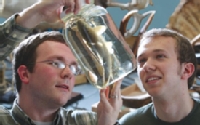Page 3 • (459 results in 0.075 seconds)
-
For either the Bachelor of Arts or Bachelor of Science degree, the student must take our introductory core sequence (BIOL 225 and 226) and a semester of genetics (BIOL 330).
) - Undergraduate Courses BIOL 111 : Biology and the Modern World - NW This course is intended to introduce students to the principles and concepts that pertain to all living organisms, with special emphasis on those topics typically encountered in everyday life, including human physiology and disease, environmental issues, and the fundamentals of genetics. Lecture and laboratory. Not intended for biology majors. (4) BIOL 116 : Introductory Ecology - NW A study of the interrelationships between organisms and
-
Shawn Brookins, Senior Capstone Seminar Alzheimer’s Disease, the most common form of progressive dementia, has transitioned among the forefront of healthcare research, lending to novel
- Implications of Tau Protein in Alzheimer's Disease: A Contemporary Literature and Research Review Shawn Brookins, Senior Capstone Seminar Alzheimer’s Disease, the most common form of progressive dementia, has transitioned among the forefront of healthcare research, lending to novel biochemistry research avenues. In particular, research has attempted to implicate malconformations of tau protein in the development of this pathology. This review summarizes the competing hypotheses that attribute truncated and
-
Exposure to bloodborne pathogens can occur through needle sticks, skin exposure to blood when skin i
-

BIOL 125/126: Molecules, Cells and Organisms/ Genes, Diversity and Ecology Name: Sean Boaglio Hometown: Longview, Wash. Major: Undeclared, leaning Biology Professor: Jacob Egge, assistant professor of biology Sean’s advice to first-year students: “Study with someone. It is a great way to meet people in your…
August 5, 2010 BIOL 125/126: Molecules, Cells and Organisms/ Genes, Diversity and Ecology Name: Sean Boaglio Hometown: Longview, Wash. Major: Undeclared, leaning Biology Professor: Jacob Egge, assistant professor of biology Sean’s advice to first-year students: “Study with someone. It is a great way to meet people in your class. And when you explain something to someone else, it also helps you understand it better.” For students who want to enter PLU’s rigorous Health Sciences track, the first
-
Biology Courses Take the following two introductory biology courses: BIOL 225: Molecules, Cells and Organisms BIOL 226: Genes, Evolution, Diversity and Ecology Often veterinary schools require you
of course prerequisites for all institutions who are members of the Association of American Veterinary Medical Colleges.Biology Courses Take the following two introductory biology courses: BIOL 225: Molecules, Cells and Organisms BIOL 226: Genes, Evolution, Diversity and Ecology Often veterinary schools require you to take a course in genetics, microbiology, anatomy and/or physiology. Please make sure you look at the requirements of individual schools. The following courses are offered at PLU
-
Biology Courses Take the following two introductory biology courses: BIOL 225: Molecules, Cells and Organisms BIOL 226: Genes, Evolution, Diversity and Ecology Often veterinary schools require you
of course prerequisites for all institutions who are members of the Association of American Veterinary Medical Colleges.Biology Courses Take the following two introductory biology courses: BIOL 225: Molecules, Cells and Organisms BIOL 226: Genes, Evolution, Diversity and Ecology Often veterinary schools require you to take a course in genetics, microbiology, anatomy and/or physiology. Please make sure you look at the requirements of individual schools. The following courses are offered at PLU
-
Biology Courses Take the following two required introductory biology courses: BIOL 225: Molecules, Cells and Organisms BIOL 226: Genes, Evolution, Diversity and Ecology You might also consider some
transferring to PLU, we recommend that you consult the following interactive equivalency guide to ensure that you are taking the correct courses for your intended major. For example, BIOL 211, 212 and 213 at Pierce College in Puyallup is equivalent to BIOL 225 and 226 at PLU.Biology Courses Take the following two required introductory biology courses: BIOL 225: Molecules, Cells and Organisms BIOL 226: Genes, Evolution, Diversity and Ecology You might also consider some of the following upper division
-
Biology Courses Take the following two required introductory biology courses: BIOL 225: Molecules, Cells and Organisms BIOL 226: Genes, Evolution, Diversity and Ecology You might also consider some
transferring to PLU, we recommend that you consult the following interactive equivalency guide to ensure that you are taking the correct courses for your intended major. For example, BIOL 211, 212 and 213 at Pierce College in Puyallup is equivalent to BIOL 225 and 226 at PLU.Biology Courses Take the following two required introductory biology courses: BIOL 225: Molecules, Cells and Organisms BIOL 226: Genes, Evolution, Diversity and Ecology You might also consider some of the following upper division
-
Biology Courses Take the following two introductory courses: BIOL 225: Molecules, Cells and Organisms BIOL 226: Genes, Evolution, Diversity and Ecology You might also consider taking some of the
, Diversity and Ecology You might also consider taking some of the following upper division courses: BIOL 330: Genetics BIOL 341: Developmental Biology BIOL 342: Microbiology BIOL 352: Comparative Anatomy BIOL 357: Histology BIOL 442: Cell Biology BIOL 453: Mammalian Physiology Often dental schools require you to take a course in microbiology, anatomy and/or physiology. Please make sure you look at the requirements of individual schools.Physics Courses PLU has two introductory physics series. Students
-
Biology Courses Take the following two introductory courses: BIOL 225: Molecules, Cells and Organisms BIOL 226: Genes, Evolution, Diversity and Ecology You might also consider taking some of the
introductory courses: BIOL 225: Molecules, Cells and Organisms BIOL 226: Genes, Evolution, Diversity and Ecology You might also consider taking some of the following upper division courses: BIOL 330: Genetics BIOL 342: Microbiology BIOL 352: Comparative Anatomy BIOL 448: Immunology BIOL 453: Mammalian Physiology Often PA schools require you to take a course in microbiology, anatomy and/or physiology. Please make sure you look at the requirements of individual schools, particularly whether they require a
Do you have any feedback for us? If so, feel free to use our Feedback Form.


